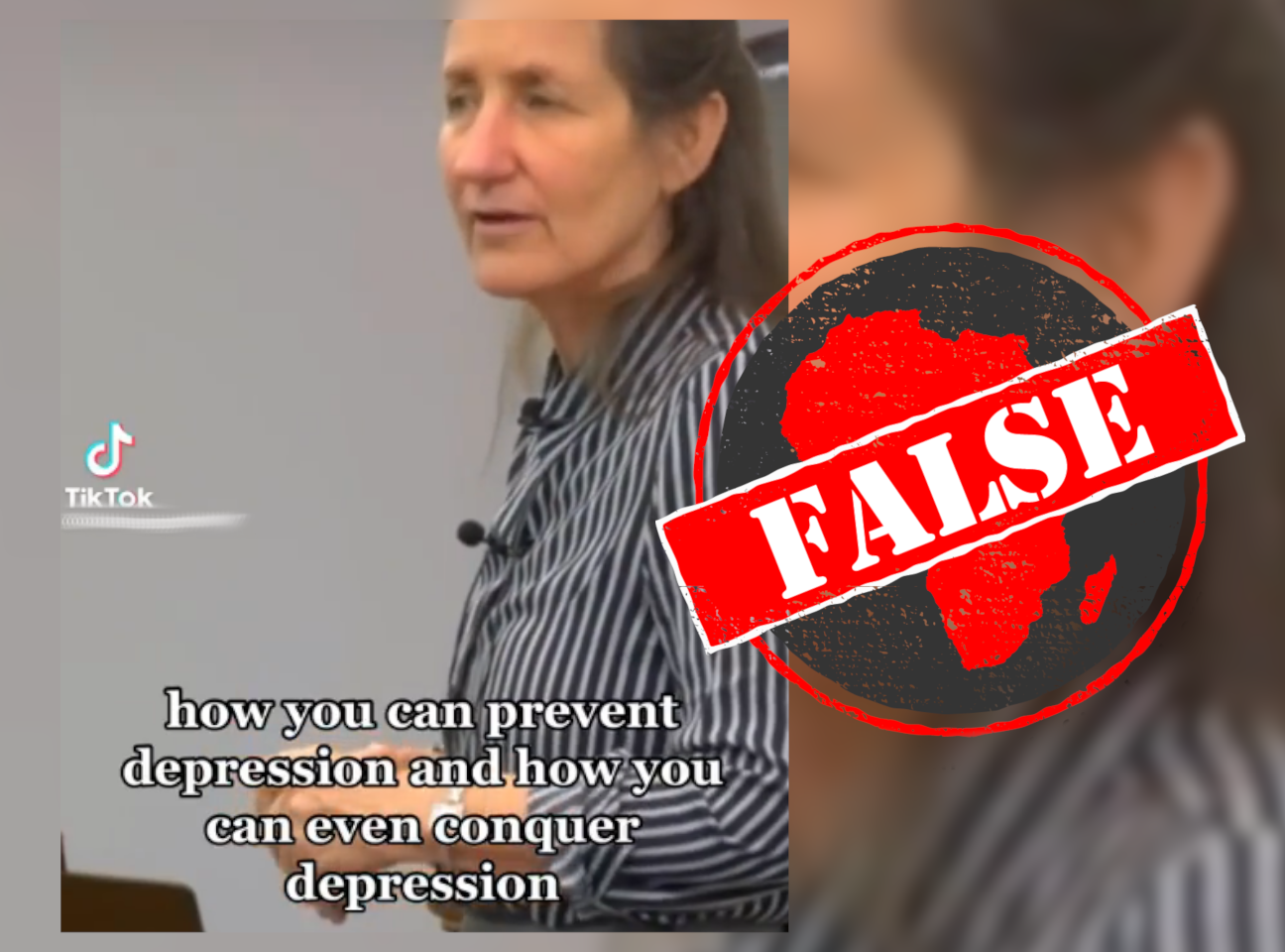IN SHORT: Depression is a complex condition with a wide variety of linked causes. The idea that the condition is caused by simple factors like consuming specific foods or psychoactive substances is not supported by evidence.
In a video clip posted to Facebook in July 2023, a woman proposes alternative ideas about depression. She claims the condition is caused by a chemical imbalance in the brain as a result of “highs” from certain foods and substances.
She is Barbara O’Neill, the controversial Australian naturopath.
O’Neill was banned for life from providing any health services in Australia in 2019. This followed an official investigation that found she gave dangerous health advice without any qualifications or membership of a recognised health organisation.
Despite the ban, videos of O’Neill lecturing and talking about what she claims to be the causes of depression are popular on social media.
The video clip can also be found on TikTok here and here. The full talk has been posted on YouTube here.
But do these claims have scientific backing? We checked.

Depression probably not caused by ‘chemical imbalance’ in brain
Depression, or major depressive disorder, is a mental illness that affects mood, sleep, appetite and concentration levels. Depression is a leading cause of disability worldwide and, in severe cases, can be fatal. Treatment usually involves medication or psychotherapy, or a combination of the two.
Psychologists view mental illness on a spectrum, from healthy functioning at one end, to distress in the middle, to severe distress and illness on the other end. Classifying someone as having a mental illness, such as major depressive disorder, is placing them somewhere on that spectrum.
In the 1960s, a popular theory suggested that depression was caused by a lack of a chemical messenger in the brain called serotonin. The pharmaceutical industry promoted this theory in the 1990s to market a new class of antidepressants that were believed to increase serotonin in some parts of the brain. These drugs are known as selective serotonin reuptake inhibitors, or SSRIs.
But research done in the decades since suggests that depression is caused by complex interactions between a wide range of factors.
Researchers now understand that the cause of depression is “much more complex” than having too little or too much of a brain chemical, Dr Gerard Sanacora told Africa Check. He is a professor of psychiatry at Yale University in the US and director of the Yale Depression Research Program.
Recent reviews of serotonin research have found “no convincing evidence” that depression is caused by low serotonin levels.
Antidepressants may be effective for reasons other than their effect on serotonin. As researchers from University College London explained in 2022, antidepressants may “numb” emotions in general, which could explain improvements in symptoms.
Another explanation is the placebo effect. This is where a treatment has some beneficial effect, not because of its ingredients, but because the person believes it is working.
Risk factors for depression
Depression does involve chemicals in the brain but, according to Harvard Medical School in the US, “there are millions, even billions, of chemical reactions that make up the dynamic system that is responsible for your mood, perceptions, and how you experience life”. Researchers believe that a combination of genetic and environmental factors lead to depressive symptoms.
Some things increase the risk of developing depression, such as having a family history of the condition, having a chronic or serious illness, or experiencing major changes or negative life events. Interactions between all of these can lead to depression. For example, someone who has a relative with depression may develop the condition after a stressful life event, such as the death of a loved one.
Food, substances and depression – an oversimplified relationship
As there are many different causes of depression, it is unlikely that any single cause will be responsible for someone developing the condition. But the video circulating on social media lists wheat, sugar, caffeine, drugs and alcohol as major causes. Another video also mentions lack of oxygen or sunlight.
Listing specific foods and substances oversimplifies the situation, Sanacora told Africa Check.
Asked whether any of these could cause depression, he said the data was “very weak”. This was especially true when it came to applying this logic to the average person.
Although poor diet or an inability to absorb certain nutrients could contribute to the processes that eventually lead to depression in some people, “currently there is no high quality evidence to convincingly demonstrate that any of the claims … are correct”, Sanacora said.
As well as oversimplifying the complexity of the condition, the claims rely on correlation rather than causation. Two things being related does not mean that one causes the other.
“For the large majority of people, the relationship [between depression and specific foods or substances] is probably more correlational,” Sanacora said.
Take the example of alcohol and other drug use. There is a strong association between problematic substance use and depression, which means that they often occur at the same time. But that doesn’t mean one caused the other, even if one appeared first.
Scientists think there are three main reasons for this association. According to the US National Institute of Mental Health (NIMH), there may be risk factors that are common to both developing depression and problematic substance use, such as genetic vulnerability, as both tend to run in families.
Second, people with depression may use substances such as alcohol or other drugs to cope with or attempt to reduce the symptoms of depression. These substances may help at first, but they can also make symptoms worse over time. The NIMH said problematic substance use could also “trigger changes in brain structure and function” that make someone more vulnerable to a mental illness, like depression. This means that any causal link between the two is still unclear.
Eliminating specific parts of the diet was not recommended without proper medical advice, Sanacora told Africa Check. “People should be extremely cautious about any suggestions of extreme changes in dietary intake or changes that have major impacts on quality of life.”
The claim that depression is caused by a chemical imbalance in the brain, as a result of certain foods and substances, is false.
Republish our content for free
For publishers: what to do if your post is rated false
A fact-checker has rated your Facebook or Instagram post as “false”, “altered”, “partly false” or “missing context”. This could have serious consequences. What do you do?
Click on our guide for the steps you should follow.
Publishers guideAfrica Check teams up with Facebook
Africa Check is a partner in Meta's third-party fact-checking programme to help stop the spread of false information on social media.
The content we rate as “false” will be downgraded on Facebook and Instagram. This means fewer people will see it.
You can also help identify false information on Facebook. This guide explains how.



Add new comment